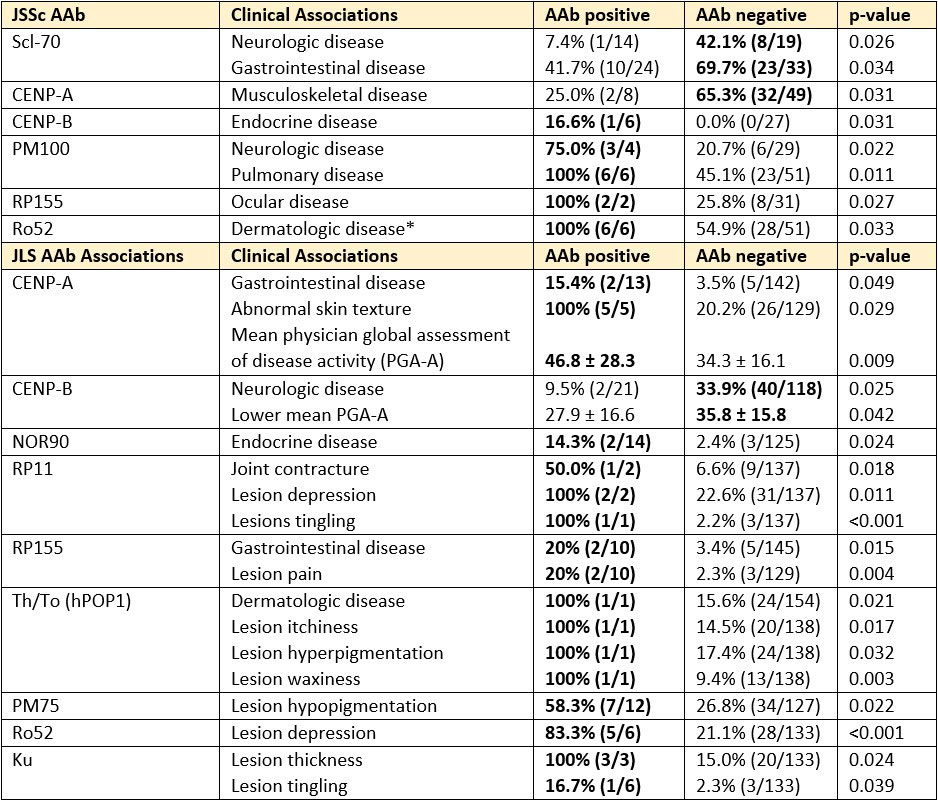Session Information
Session Type: Poster Session D
Session Time: 1:00PM-3:00PM
Background/Purpose: Commercially available autoantibody (AAb) panels are developed for adult rheumatological diseases; application to pediatric disease has not been established. As a pediatric scleroderma referral center and clinic, one of our main interests is to examine the properties of the Euroimmun™ Scleroderma Disease Profile in juvenile-onset scleroderma. These panels may be useful for prognosticating disease manifestations within juvenile systemic sclerosis (JSSc) and juvenile localized scleroderma (JLS), and therefore assisting with monitoring for specific organ manifestations.
Methods: Plasma from 42 age-matched healthy children, 60 JSSc patients, and 155 JLS patients (IRB #PRO11060222) and underwent AAb phenotyping with the Euroimmun™ (Luebeck, Germany) Scleroderma Disease Profile (line immunoassays: LIA) for 13 distinct AAbs. Pediatric cutoffs were defined as the number of standard deviations (minimum of 2) above the mean to test < 5% of pediatric control as positive. We determined AAb positivity among JSSc and JLS cohorts using these cutoffs. Chi-square analysis with significance defined as p < 0.05 was used to compare AAb profiles between cohorts and determine relationships with clinical variables.
Results: Overall 75% of JSSc patients and 33% of JLS patients were positive for at least one AAb. The most common AAbs in JSSc were Scl-70 (58%), CENP-B (22%), CENP-A (18%), and PM100 (16%). The most common AAbs in the JLS cohort were CENP-B (38%) and NOR-90 (22%). Several AAb associations with clinical features were found in JSSc and JLS (Table 1). There were some notable findings. In JSSc those with AAbs associated with overlap features, PM100 and Ro52, had more neurological disease (peripheral neuropathy), pulmonary disease (interstitial lung disease), and dermatological manifestations (vitiligo, psoriasis, sclerodactyly, calcinosis, shiny skin, Gottron’s papules/sign, heliotrope), respectively. In JLS, the RNA Polymerase III AAbs (RP11 and RP155) associated with deeper tissue involvement with lesion pain, tingling, depression and joint contractures, and CENP-A was associated with higher disease activity.
Conclusion: In one of the largest juvenile cohorts with full AAb testing, most JSSc patients had a positive AAb on the LIA Scleroderma Disease Profile specific for either Scl-70, CENP-A, CENP-B, and/or PM100, mirroring adult SSc AAb frequency. A higher frequency of centromere AAb was detected compared to prior JSSc cohort descriptions. In our cohort it was associated with a protective effect for musculoskeletal disease manifestations. JSSc patients with overlap associated AAbs had more frequent peripheral neuropathy and interstitial lung disease which could impact surveillance recommendations for these patients. In JLS, those with positive RNA Polymerase III AAbs had more frequent deep tissue involvement, which clinically may warrant more surveillance of deep tissue with modalities such as ultrasound or Magnetic resonance imaging, in addition to ensuring the involvement of physical therapy in the treatment regimen. Further investigation is required to confirm this panel’s utility in clinical practice.
Bolded values are more frequent or greater for their respective AAb status.
*Dermatologic disease manifestations defined as: vitiligo, psoriasis, sclerodactyly, calcinosis, shiny skin, Gottron’s papules/sign, heliotrope.
To cite this abstract in AMA style:
Li J, Mirizio E, Buhler K, Stevens A, Choi M, Schollaert-Fitch K, Torok K, Liu C, Fritzler M. Focused Clinical Correlation of Autoantibody Testing in Juvenile Systemic Sclerosis and Localized Scleroderma Using the Euroimmun™ Scleroderma Disease Profile [abstract]. Arthritis Rheumatol. 2022; 74 (suppl 9). https://acrabstracts.org/abstract/focused-clinical-correlation-of-autoantibody-testing-in-juvenile-systemic-sclerosis-and-localized-scleroderma-using-the-euroimmun-scleroderma-disease-profile/. Accessed .« Back to ACR Convergence 2022
ACR Meeting Abstracts - https://acrabstracts.org/abstract/focused-clinical-correlation-of-autoantibody-testing-in-juvenile-systemic-sclerosis-and-localized-scleroderma-using-the-euroimmun-scleroderma-disease-profile/

